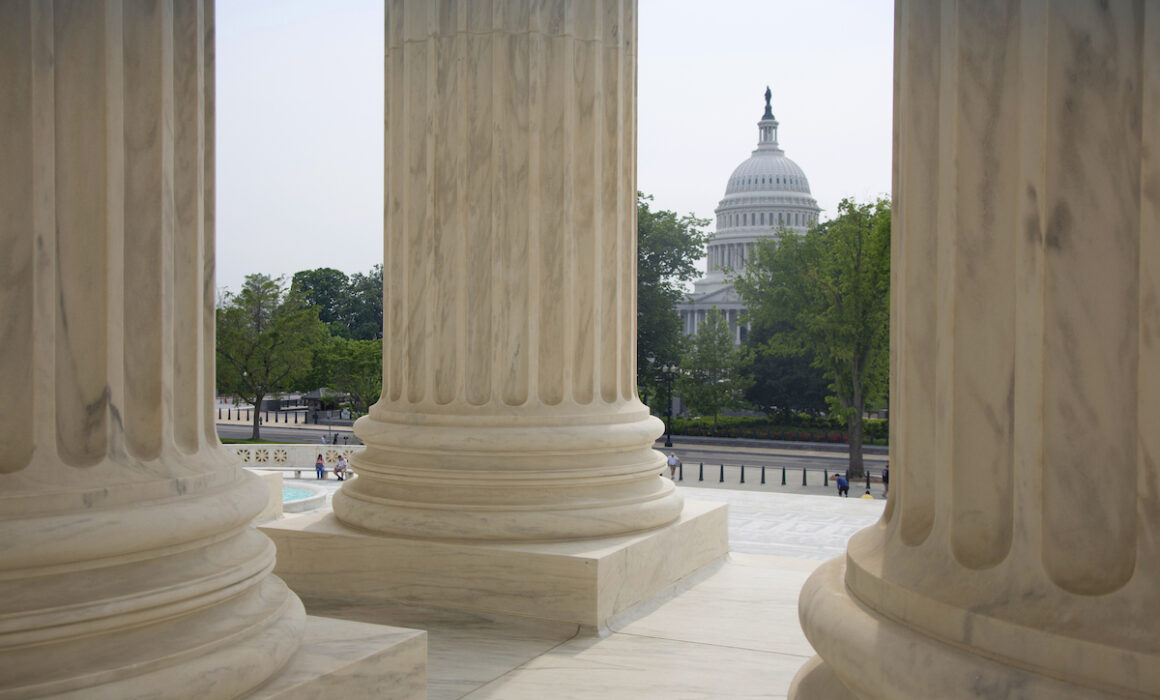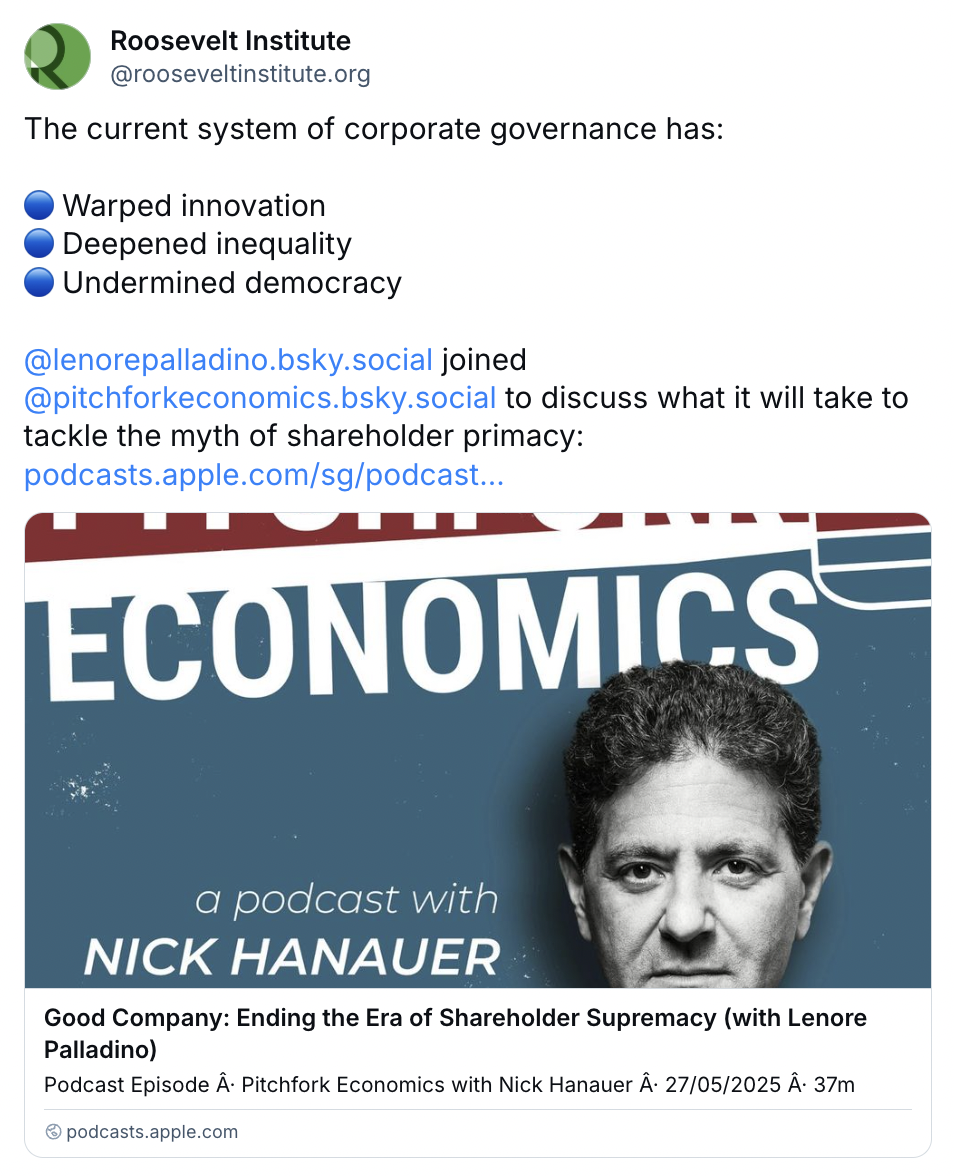SCOTUS’s Attacks on Agencies Put the Fed at Risk Too
May 30, 2025
Plus, a court challenge to tariffs and the Trump 2.0 energy landscape so far.
The Roosevelt Rundown features our top stories of the week.
(Grant Faint/Getty Images)
SCOTUS’s Muddled Take on Agency Independence
Last week, the Supreme Court upheld the president’s decision to fire officials from the National Labor Relations Board (NLRB) and the Merit Systems Protection Board (MSPB), while also noting that this influential power wouldn’t extend to the Federal Reserve. As Roosevelt Senior Fellow Sarah Bloom Raskin warns, the Court’s inconsistent rationale “renders the Fed more vulnerable to political threats, not less,” and raises urgent concerns about independence and accountability more broadly.
“What we take from these rulings is a clear signal that the Court’s majority wants to pick and choose which agencies can be designed to be independent of executive branch control, and which cannot,” she writes. Several entities—not just the NLRB, MSPB, and Fed—were intentionally designed by Congress, using structures like term limits, to be independent from the White House.
“If the Court wants to get into the business of deciding which entities should be independent and which should not, holding that the Fed is singularly exceptional in its independence, then it must grapple with a deeper question,” Bloom Raskin writes. “Why is Congress’s safeguarding of worker representation or its safeguarding of fair employment systems any different from its safeguarding of monetary policy and regulatory policy?”
Democracy demands that federal entities fulfill their legal mandates, not the whims of the president. The administration’s slash-and-burn approach to government, of which these firings are just a part, is a power grab meant to chip away at the state’s duty and ability to serve the public good.
Read the post: The Supreme Court Wants to Pick and Choose Which Agencies Can Be Independent
Court Strikes Down Trump’s Most Sweeping Tariffs
Yesterday, an appeals court issued a temporary pause on the US Court of International Trade’s May 28 ruling against the indiscriminate tariffs Trump placed on dozens of countries. If the trade court’s ruling is allowed to stand, the decision will be “hugely consequential for [Trump’s] trade negotiating agenda,” says Roosevelt’s Todd N. Tucker.
The ruling struck down the blanket 10 percent tariffs on all US trading partners, as well as those imposed on Mexico, Canada, and China after Trump declared an emergency in an alleged effort to stop drug trafficking. But while the president’s attempt to use emergency powers to impose sweeping trade restrictions was limited by the trade court’s ruling, more narrow tariffs, like those limited to specific industries, were allowed to remain in effect. “It is good for the economy and country that trade will get slotted back into the slightly more boring world of Section 232 and 301 tariffs, which require a bit more process,” Tucker says. “Or just working with Congress to pass new trade deals.”
Read more about how targeted tariffs can be used for a progressive trade agenda, and read Tucker’s earlier analysis of the Trump tariffs.
Trump’s Energy Agenda, So Far
In its first four months, the Trump administration has fostered uncertainty in the energy industry and attacked efforts to transition to renewable energy. In a new blog post, Roosevelt’s Oskar Dye-Furstenberg examines current trends in the energy landscape and how the president’s agenda has thus far shaped it.
“While Trump’s outward support for the fossil fuel industry—and hostility to anything addressing climate change—has been clear,” Dye-Furstenberg writes, “the pathway to economic prosperity and ‘energy dominance’ is less than obvious.” The realities of global interdependence, the administration’s erratic trade policies, and the likely rollback of clean energy incentives in the Inflation Reduction Act all but guarantee continued turbulence in the months and years ahead.
Read the post: The Hollow Energy Agenda of Trump’s First Four Months
What We’re Talking About
What We’re Reading
- On next week’s jobs report: Roosevelt’s Michael Madowitz previews what to look for in the May jobs data to see the impact of tariffs.
- On RFK Jr.’s “health” initiatives: “We don’t need to create a renaissance of easily preventable infectious diseases, but I fear that’s where we’re headed,” Roosevelt Fellow and Author-in-Residence Miranda Yaver told Newsweek this week in response to the anti-vaccine recommendations in Health Secretary Robert F. Kennedy Jr.’s new, so-called “Make America Healthy Again” proposal.
- Yaver said “the deprioritization of policy expertise” threatens to erode “trust in agencies and health recommendations,” which “will be difficult to rebuild, especially as we see the continued hollowing out of the public health bureaucracy.”
- She also called out the administration for claiming to advocate for nutrition while cutting SNAP benefits and doing nothing to solve the underlying problem of food deserts.
- On the climate crisis and denial of it: FEMA is facing a backlog of emergency aid requests from states, the Washington Post reports, and experts fear the administration’s support for states in natural disaster recovery could continue to wane over the summer storm season.
- The Fed shut down two internal groups specially dedicated to assessing the impact of climate risk on financial stability, despite widespread evidence that climate change is already having profound effects on financial systems.



